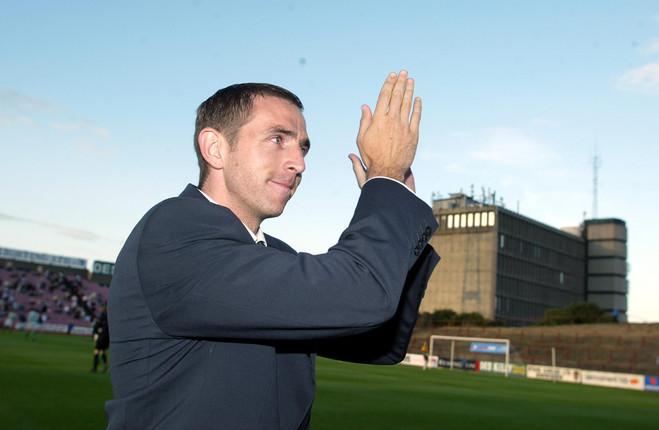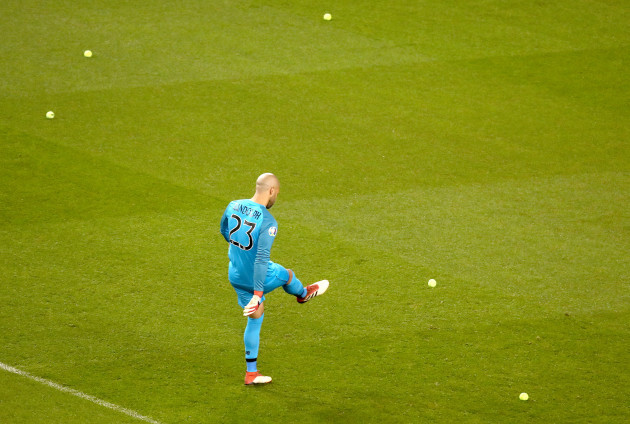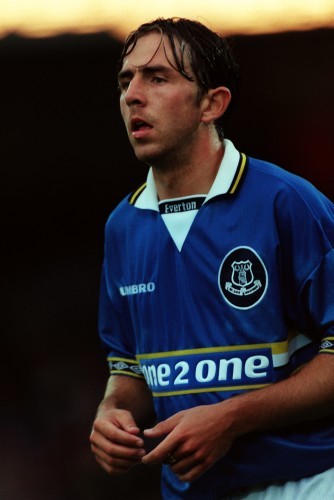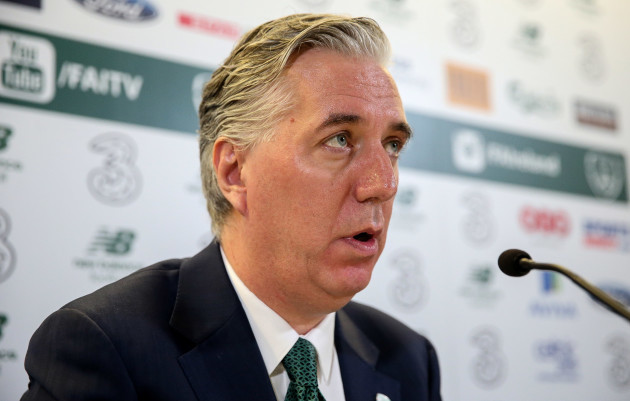SPEAKING ABOUT THE politics of sport is not something everyone associated with football is always comfortable with.
Players, coaches, pundits, journalists and everyone else affiliated with the beautiful game in some instances prefer to stick to what is going on the pitch
And when the topic of debate is a powerful organisation such as the Football Association of Ireland, there is a particular reluctance to delve too deep. Some individuals are concerned about being denied progression in the game as a result of criticisms, while others simply are uninterested in rigorously engaging with the less-than-sexy topic of football administration.
However, there are many others in the game who are more than willing to ask serious questions of the powers that be. Ex-Ireland internationals Richie Sadlier and Niall Quinn as well as former manager Brian Kerr have all spoken passionately in recent days of their misgivings in relation to the people responsible for running football in this country.
Former Aston Villa, Everton and Bohemians midfielder Gareth Farrelly is another individual who certainly could not be accused of shying away from the topic. Despite having to watch events from afar in England, where he now works as a lawyer, Farrelly has been vocal on Twitter about the ills affecting the sport he loves.
With all the various controversies and changes that have been implemented — the €100,000 loan, the previously undisclosed financial arrangements, the sudden switch of CEO — there is an overriding sense that there are still more questions than answers, some of which it is expected will be asked when John Delaney and co attend an Oireachtas hearing due to take place on 10 April.
And while much of the attention has been on the former CEO and newly appointed executive vice-president, Farrelly believes it is wrong to focus overly on one individual, suggesting instead that there is an institutional problem within the organisation.
“It’s a really important time,” he tells The42. “I think there’s an opportunity for change, which is really important for Irish football, but I’m also quite cautious, because you’re obviously dealing with people who are quite capable, well-resourced and experienced. So there’s an obligation and a responsibility from the media to maintain a focus and a scrutiny on this.
Fundamentally how it’s been set out is with a view to [John Delaney] staying [in the association]. There’s a huge emphasis and focus on Euro 2020 and the fact that there are going to be games in Ireland. In some ways, that’s a legacy. That’s how they want the epitaph to be written on the basis of a particular narrative as to what they’ve done. The point being for a considerable period, they’ve always been able to control that narrative. While people have been able to present things in the past, they’ve always managed to bat it away or deal with it, and return to normal services. My hope is that that won’t be the case [anymore].”
Farrelly believes the entire the FAI board, a number of whom have been in their current roles for over a decade, also face serious questions.
“I don’t think that [the issue lies] solely at John Delaney’s door — there are huge questions to be asked of the board as well. That’s when you have to look back further and look at the period of time that John Delaney’s been involved and also how he’s surrounded himself with people who will naturally seek to protect him and also themselves.”
And as for Tuesday night’s tennis-ball protest at the Aviva Stadium during the Ireland-Georgia game, Farrelly is closer to the Richie Sadlier line of thinking than the somewhat contrary views espoused by Eamon Dunphy and Ronnie Whelan among others.
“My understanding is that fans are incredibly frustrated. They pay a lot of money and they’ve also been fed a particular narrative for a period of time. There’s an epiphany to this. Despite what people probably knew all along, they never really had the evidence to support it.
“So for me, people are entitled to show their frustration if they want to. I haven’t got an issue with that. You’ll always get people who make more on this and say it may have had an impact on the performance or the game. I don’t buy into that. Talk is easy. The difficulty you had is people wanting to protest previously and having been stopped from doing so. I know for a period of time, there have been flags removed, people have been searched going into grounds… People are free and should be able to protest if they want to.”
There has been much talk and debate in recent days about the CEO role, which has been undertaken on a temporary basis by Rea Walshe, with a permanent successor to Delaney to be announced in due course. However, Farrelly believes there are deeper issues to be discussed than the identity of the organisation’s leader and that the focus should remain elsewhere for now.
“It’s a really good question, but I don’t think we’re at that point at all. Niall Quinn has been mentioned and Niall spoke really well, but I don’t think we can get to that. My issue on what tends to happen in all of these dramas, scandals, episodes — as soon as something happens, people are already writing the lists of who the new incumbents are going to be. It’s very easy to dive into something where I don’t think it’s well-placed at this time. Fundamentally, everything is as it is.
Mick McCarthy and his players did a brilliant job winning their first two games. In some ways, there’s a restoration of positivity around performance, but these governance issues and the questions that need to be asked in front of Oireachtas are the next immediate critical point. I don’t think you can start to have a conversation about who the next person should be [as CEO] because again, there has to be a due diligence process in that. The media will naturally promote certain people, but of some of the people I’ve heard so far, some of them are heavily connected to the current regime. I don’t understand how the media could write about that. What’s needed now is a fundamental, institutional change for the benefit of Irish football.
“I believe it’s an institutional issue and if you look at institutional problems or corruption or lack of governance, lack of systems and procedures and all of those things, it’s fundamentally been allowed to happen, because there hasn’t been adequate checks and balances in place.
“They stopped the media asking questions in AGMs [a number of years ago]. I don’t know any other associations where that’s been the case and equally from a media point of view, there are some fabulous journalists in Ireland who can hold their own anywhere, yet there was an acceptance that you can’t ask questions, so it’s controlled propaganda. It’s been like this for a period of time. You’ve had the initial salvo and disclosure of information. I believe there’s possibly more to come, but we aren’t really further forward, are we? They are bullish enough and resourced and capable enough to seek to ride this particular situation out.”
Farrelly continues: “I’ve always felt that there needs to be more questioning. There needs to be more accountability and responsibility. These people need to be challenged, and I don’t think that’s happened. What we have now, I don’t think it’s the end by any means, but it’s positive compared to where we were at — an uneasy truce of what we can ask, what we can’t ask, what we can do, what we can’t do. We’ve kind of gone beyond that, which is good.
“There’s incredible talent in Ireland. I’ll always think there’s an opportunity to do things properly. Far too often, it’s easy to move onto the next thing without really getting to the bottom of it. What has always fascinated me, going back to the Genesis Report, and I was home between 2004 and 2006, is that I don’t see how you can carry out a check on yourself and put forward recommendations. There has to be an independent review and it has to be wholly independent — that’s been a big problem. You look around the world at institutions that have recently had issues. Any of those investigations or reports or recommendations have all been independently undertaken. That’s what people have to push for — ask the serious questions. Challenge these people and make them responsible for what they’re doing.
“What tends to happen is when something happens, we forget what’s gone before. It’s important to set out so many things that have happened in the last few years that need to be brought back into people’s minds again.”
Farrelly is also concerned at how the FAI have often sought to silence dissenters, often through legal means, despite their criticisms and questions appearing to be totally valid, as seemed to be the case with the recent Sunday Times reporting.
In a world of freedom of expression, people were injuncted or challenged or threatened. Even when it’s true. People have had a lot to lose and have had to take a view on things, and that’s a really poor indictment on where we’re at.”
In addition to his work as a sport and litigation lawyer, the 43-year-old Dubliner spends time working as a Football Association Independent Football Panel Member and a Uefa MIP Participant, which is described on its official website as “giving [former internationals] the tools for match-winning performances in football administration and management as part of a second career”.
“There’s a mandate from Uefa,” Farrelly explains. “They want more ex-players involved not just as managers, coaches and different things, but they want more ex-players involved in the management and administration of the game. I think that’s a good thing. We’re in New York next week for the sixth session, focusing on US sporting models. So the course has been excellent, but for me, I’ve been very fortunate with education and constantly trying to continue to learn. The course kind of gives you that.”
So given his clear interest in football administration, there is one natural follow up question: would Farrelly ever consider working within the FAI one day?
“Not at the minute,” he says. “But the flipside for me is I’m an incredibly proud Irishman. I was fortunate to do all of the things I dreamt about, representing my country from when I was a boy. So you never lose that love of your country. The thing at the moment is that change is needed and we need to support the people who have been advocating this and the people who have been isolated when it hasn’t been in the mainstream, despite these things going on.
“These things are under the spotlight now, but there are a lot of people who have been speaking out about this for quite a long time. They’ve been quite isolated and people haven’t wanted to listen to them. And they were fundamentally right. But nothing has been proven yet. I hope firstly that those questions are asked and that we get worthwhile answers.”
Subscribe to our new podcast, The42 Rugby Weekly, here:




